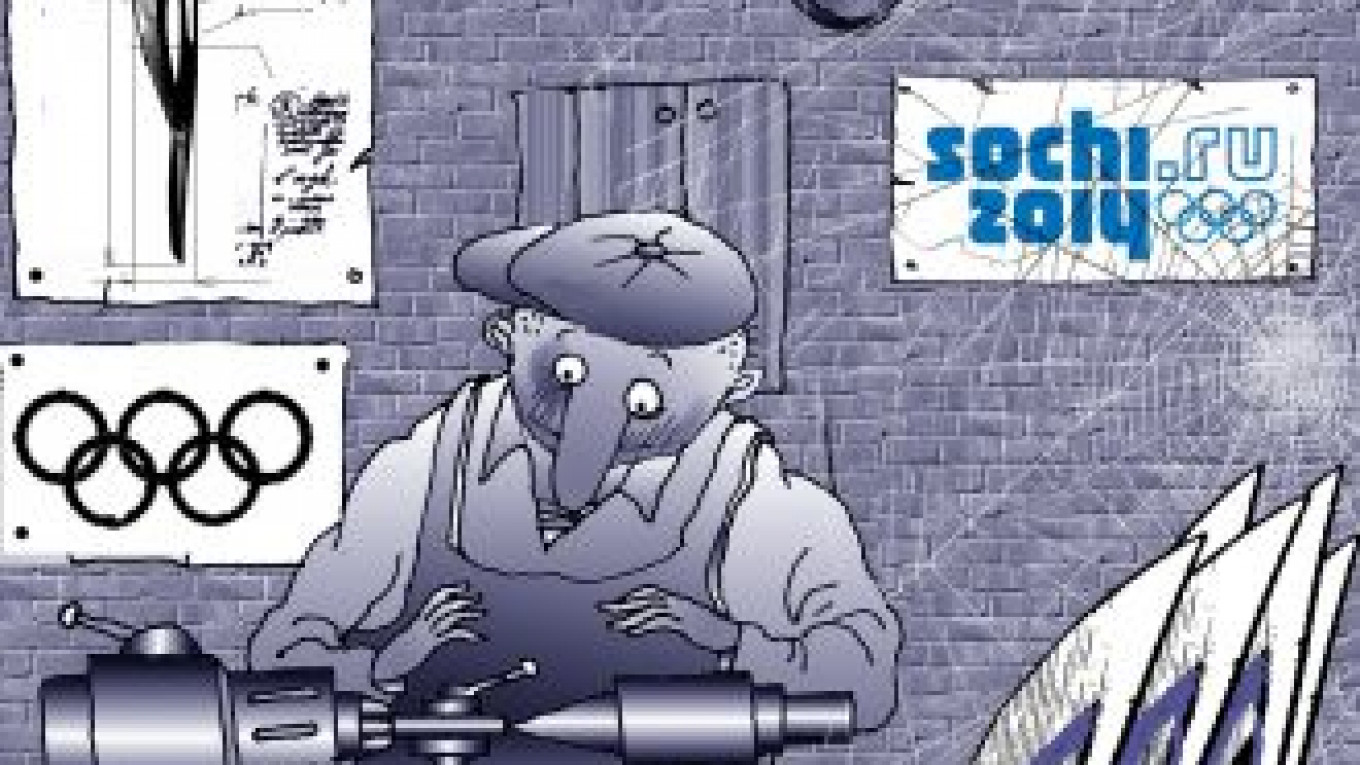The flame of the Olympic torch went out Oct. 6. Worse, it happened while the torch was being carried by Shavarsh Karapetyan, the world-champion swimmer who once saved 20 people trapped in a trolleybus that had fallen to the bottom of the Yerevan reservoir.
"OK," you say, "so the flame went out. So what? These things happen." The only problem is that this was by no means the first time. This has happened to Russian-made Olympic torches at least 44 times? since then.
This raises a number of serious questions.
In a typical Russian scheme, a defense industry factor director owns a private business on site and pockets all of its profits, while the government picks up the tab for all of its operating expenses.
The authorities claim that the Olympic torches were manufactured by the Krasnoyarsk Machine Building Plant, or Krasmash, a top-secret facility that produces Sineva ballistic missiles. We do not know how well and accurately the factory's missiles fly — that information is highly classified ?€” but we do see how its torches burn.
A torch is a much simpler device than a missile. At its core, an Olympic torch is nothing more than a large, fancy cigarette lighter. So the first question is: Do the Sineva missiles fly like the Olympic torches burn?
The second question is also very simple. Cigarette lighters, a cheap commodity product, are a dime a dozen. The Krasnoyarsk Machine Building Plant charged Russian taxpayers 12,942 rubles ($400) for each of the 16,000 torches it produced, coming to a total of $6.4 million. We do not know the price of a single Krasmash missile ?€” the government jealously guards that information ?€” but we do see what they charge for their torches. So the second question is this: Are their missiles just as overpriced as their torches?
The third question is even more interesting. The authorities have maintained that all payment for the torches went to the top-secret Krasnoyarsk plant. This implies that even if an overpayment did occur, the money would have served as an indirect subsidy for Russia's bloated defense industry.
But according to information uncovered by blogger Yevgeny Kozlov, the Krasnoyarsk Machine Building Plant did not assemble the torches at all. They were produced by a company called Variant-999, which makes metal-frame furniture, refrigerator and retail display equipment. The only connection that Variant-999 has to Krasnoyarsk Machine Building Plant is that it rents out factory space from the plant.
But how could the top-secret manufacturer of advanced ballistic missiles rent out space to a private company? If the Krasnoyarsk plant is well suited to producing furniture, refrigerator and retail display equipment at a profit, why isn't it manufacturing and selling these products itself? Can you imagine the Intel factory renting out a little corner office to its arch rival, AMD processors?
In reality, though, every Russian defense factory has similar private enterprises on its premises. In a typical Russian scheme, the factory director owns a private business on site and pockets all of its profits, while the government picks up the tab for all of its operating expenses. Sometimes, however, the owner of the private business pays the operating expenses but pays next to nothing for rent.
These are classic Russian schemes to siphon large budgetary funds into private hands.
And there's more. The Kremlin likes to boast that the route that the Olympic torch will travel throughout Russia before the Winter Games begin in February will be the longest in history ?€” more than 40,000 kilometers. In the process, the Olympic flame will be taken to every region of Russia ?€” to the top of Mount Elbrus, the highest peak in Europe, the North Pole, the bottom of Lake Baikal and even out into space.
As Sochi organizing committee head Dmitry Chernyshenko so enthusiastically said, "Nobody has done anything like it before." For some reason, that does not surprise me.
Yulia Latynina hosts a political talk show on Ekho Moskvy radio.
A Message from The Moscow Times:
Dear readers,
We are facing unprecedented challenges. Russia's Prosecutor General's Office has designated The Moscow Times as an "undesirable" organization, criminalizing our work and putting our staff at risk of prosecution. This follows our earlier unjust labeling as a "foreign agent."
These actions are direct attempts to silence independent journalism in Russia. The authorities claim our work "discredits the decisions of the Russian leadership." We see things differently: we strive to provide accurate, unbiased reporting on Russia.
We, the journalists of The Moscow Times, refuse to be silenced. But to continue our work, we need your help.
Your support, no matter how small, makes a world of difference. If you can, please support us monthly starting from just $2. It's quick to set up, and every contribution makes a significant impact.
By supporting The Moscow Times, you're defending open, independent journalism in the face of repression. Thank you for standing with us.
Remind me later.


